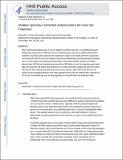Shallow Sparsely-Connected Autoencoders for Gene Set Projection
Author(s)
Gold, Maxwell P.; Lenail, Alexander; Fraenkel, Ernest
DownloadAccepted version (1.058Mb)
Open Access Policy
Open Access Policy
Creative Commons Attribution-Noncommercial-Share Alike
Terms of use
Metadata
Show full item recordAbstract
When analyzing biological data, it can be helpful to consider gene sets, or predefined groups of biologically related genes. Methods exist for identifying gene sets that are differential between conditions, but large public datasets from consortium projects and single-cell RNA-Sequencing have opened the door for gene set analysis using more sophisticated machine learning techniques, such as autoencoders and variational autoencoders. We present shallow sparsely-connected autoencoders (SSCAs) and variational autoencoders (SSCVAs) as tools for projecting gene-level data onto gene sets. We tested these approaches on single-cell RNA-Sequencing data from blood cells and on RNA-Sequencing data from breast cancer patients. Both SSCA and SSCVA can recover known biological features from these datasets and the SSCVA method often outperforms SSCA (and six existing gene set scoring algorithms) on classification and prediction tasks.
Date issued
2019-03Department
Massachusetts Institute of Technology. Department of Biological EngineeringJournal
Pacific Symposium on Biocomputing 2019
Publisher
World Scientific Pub Co Pte Lt
Citation
Gold, Maxwell P., Alexander LeNail, and Ernest Fraenkel. "Shallow Sparsely-Connected Autoencoders for Gene Set Projection." Paper presented at the Pacific Symposium on Biocomputing 2019 (Kohala Coast, Hawaii, USA, 3-7 January 2019) 24 (2019): 374-385 © 2019 The Author(s)
Version: Author's final manuscript
ISBN
9789813279810